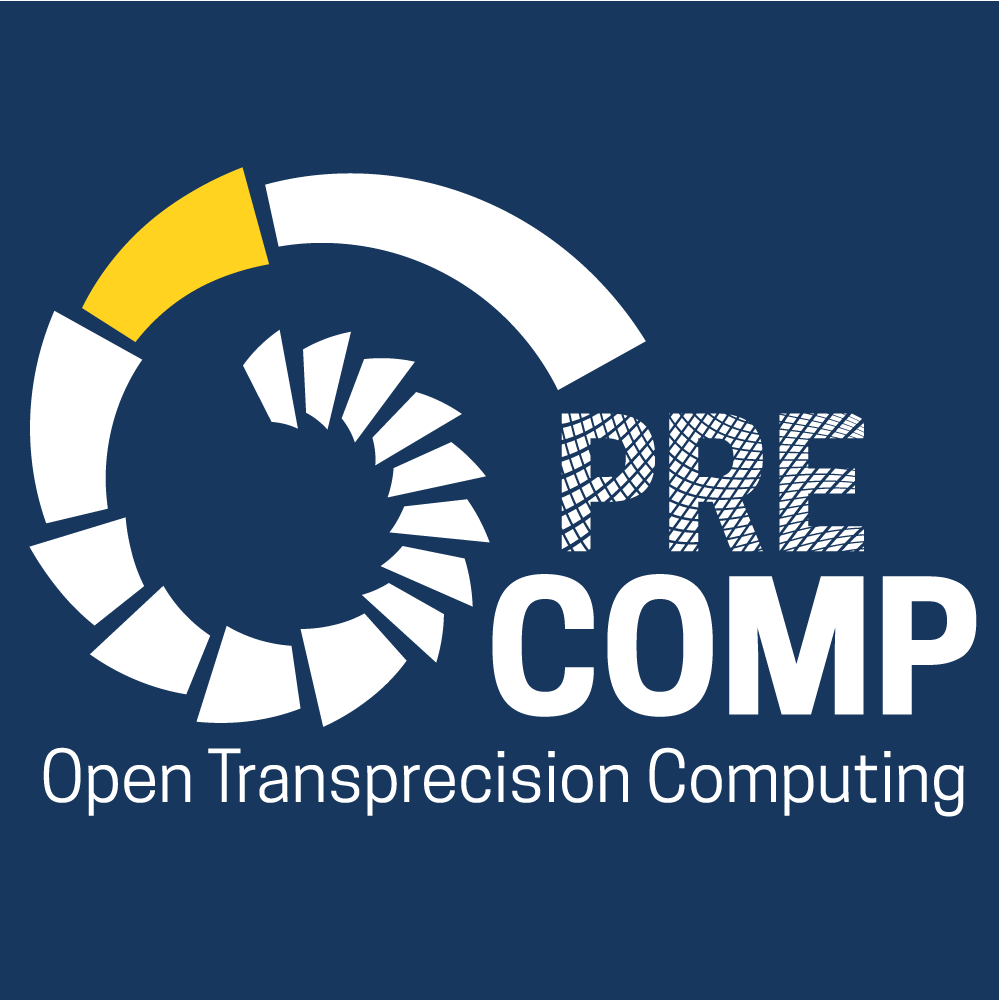ISC HIGH PERFORMANCE 2018
THURSDAY, JUNE 28, 2018FRANKFURT ,GERMANY
THE EVENT FOR HIGH PERFORMANCE COMPUTING, NETWORKING AND STORAGE
WORKSHOP
Approximate and Transprecision Computing on Emerging Technologies (ATCET)ORGANIZERS
Dr. Costas Bekas
Dr Cristiano Malossi
Prof. Luca Benini
Prof. Enrique S. Quintana-Ortí
Prof. Dimitrios S. Nikolopoulos
Approximate and Transprecision Computing on Emerging Technologies (ATCET)
In the last 10 years, the demand for new computing strategies driven by energy-efficiency has grown exponentially. Flop-per-watt (thus, per-euro) has become de-facto a driving model in hardware design. Results in this direction have been significant, leveraging first multi-core parallelism and then recently moving toward heterogeneous architectures (e.g., multicore CPU coupled with GP-GPUs). However, these evolutions will not be sufficient in the long term. To maintain an exponential increase in computational efficiency, we will need to rely either on an unlikely breakthrough discovery in hardware technology, or on a fundamental change in computing paradigms.
This workshop is dedicated to experts who explore approximation in hardware and software from both a statistical and a deterministic viewpoint, as a computing paradigm shift to break the current performance and energy-efficiency barriers of systems at all scales, from sensors to supercomputers. Approximate computing is a viable method for building more efficient, scalable and sustainable systems. However, it also places formidable challenges across the entire computing software and hardware stack. Addressing these challenges requires balanced expertise in mathematics, algorithms, software, architecture design and emerging computing platforms. The objective of this workshop is to bring together experts across these areas to present the latest findings and discuss future opportunities for approximate computing. In more detail, the workshop will cover the following areas:
- Approximate and transprecision computing: from the physical limits to the architecture and circuit design; from the algorithm design to the error analysis; from innovative technology to real applications.
- Programming abstractions: from structured and disciplined approximation in computation, communication and data transfers, to quality control and techniques to recover from over-approximation.
- Computing platforms: from tiny low-power devices for IoT applications, up to classical HPC systems embedding imprecise massively parallel accelerator.
- Applications: examples from data analytics, machine learning, deep learning, and scientific computing, where uncompromised quality with scalable order-of-magnitude time- and energy-to-solution reduction is reachable relying on approximation for a significant amount of calculations.
Key Topics
The workshop will cover the following key topics:
- Beyond Moore’s law
- Future challenges for programming models and languages
- Exascale Systems
The workshop provides an opportunity to have in-depth discussions, presentations, and interactions on these topics. This will promote future collaborations and better coordination around the development on approximate and transprecision computing techniques.
Expected Outcomes
- Promote research and development in approximate and transprecision computing
- Align developments in algorithms, software, and hardware design towards unified and successful platforms for approximate and transprecision computing
- Foster a common discussion across multiple disciplines
- Raise energy-awareness in the big data community as well as in HPC
- Promote collaboration between academia, industry and SMEs
- Strengthen the community in energy efficient computing
Agenda
The full agenda is detailed in the following table.
| Time | Type of Talk | Authors | Title |
|---|---|---|---|
| 09:00 09:10 | Opening / Introduction | ||
| 09:10 10:00 | Keynote Talk | Piotr Luszczek | “Title Towards Numerical Benchmark for Half-Precision Floating Point Arithmetic” |
| 10:00 10:30 | Contributed Talk 1 | Konstantinos Parasyris, Nikolaos Bellas, Christos Antonopoulos and Spyros Lalis | “Exploring the Effects of Code Optimizations on CPU Frequency Margins” |
| 10:30 11:00 | Contributed Talk 2 | Michael Bromberger and Wolfgang Karl | “A Transparent View On Approximate Computing Methods For Tuning Applications” |
| 11:00 11:30 | Coffee break | ||
| 11:30 12:00 | Contributed Talk 3 | Hartwig Anzt, Goran Flegar, Vedran Novakovic, Enrique S. Quintana-Orti and Andres Tomas | “Residual Replacement in Mixed-Precision Iterative Refinement for Sparse Linear Systems” |
| 12:00 12:30 | Contributed Talk 4 | Albert N. Kahira, Leonardo Arturo Bautista Gomez and Rosa M. Badia | “Training Deep Neural Networks with Low Precision Input Data: A Hurricane Prediction Case Study” |
| 12:30 13:00 | Contributed Talk 5 | Giulia Stazi, Lorenzo Adani, Antonio Mastrandrea, Mauro Olivieri and Francesco Menichelli | “Impact of Approximate Memory Data Allocation on a H.264 Software Video Encoder” |
Important Dates
Call for papers in now open.
- Full Paper Submission: 11 May 2018 (AoE) (extended deadline)
Paper acceptance notification: 18 May 2018 (AoE) (extended deadline)
Camera ready papers due 22 June 2018
Workshop day: 28 June 2018
Information for authors
- Accepted workshop papers will be published in a special edition of “Springer’s Lecture Notes in Computer Science (LNCS)”:
- All papers should be submitted electronically through the workshop website following the Springer template. The Easychair submission portal is:
- Author guidelines are available from Springer:
- Latex template:
- Word template:
-
We accept papers with no more than eight pages in single-column layout.
-
The only language accepted is English.
- Papers will be peer-reviewed by at least two reviewers.
- By submitting a paper you agree to present the paper at ATCET in Frankfurt, Germany.
- At least one author has to register for ISC High Performance Workshop participation.
Special Issue
Authors of best papers will be invited to submit an extended version of the paper in a journal to be determined.
Organising Committee and Contacts
Program Committee Members
- Dionysios Diamantopoulos, IBM Research – Zurich, Switzerland
- Frank K. Gurkaynak, ETH Zurich, Switzerland
- Henry-Pierre Charles, CEA, France
- Luca Gammaitoni, University of Perugia, Italy
- Michela Milano, University of Bologna, Italy
- Andrew Emerson, CINECA, Italy
- Andres Tomas-Dominguez, University Jaume I, Spain
- Mahwish Arif, Queen’s University of Belfast, UK
- Corine Lamagdeleine, GreenWaves Technologies, France
- Norbert Wehn, University of Kaiserslautern, Germany



